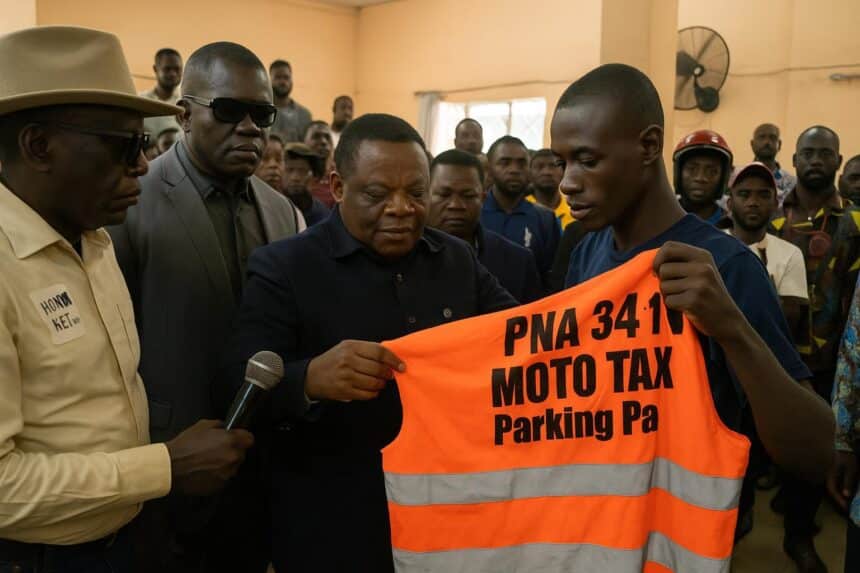High-visibility gear hits the streets
Flashes of neon now punctuate the busy avenues of Côte Matève and Tié-Tié. On 13 October, the Federation of Public Transport Professionals, known locally as Fesyptc, handed out branded reflective vests to its moto-taxi members during a packed general assembly in Mpita.
- High-visibility gear hits the streets
- Decree 2024-324 raises the bar
- Union calls for compliance, not confrontation
- Pressure from security forces grows
- Riders speak out on new costs
- Training re-enters the spotlight
- Economic ripple effect for households
- Government seeks orderly growth
- What comes next for riders and passengers
The gear is more than fashion. According to Fesyptc secretary-general Bienvenu Mabiala, the vest is a portable permit: “Police and passengers can identify a wp-signup.phped rider in a second,” he told the crowd, stressing that visibility often means survival in Pointe-Noire’s dense traffic.
Decree 2024-324 raises the bar
Behind the wardrobe change lies a nationwide reform. Articles 3, 4, 5, 6, 8 and 9 of Decree 2024-324, signed on 9 July, tighten every bolt of the motorcycle-taxi trade, from the helmet on the driver’s head to the plate on the rear mudguard.
The text, enforced by officers of the Presidential Security Directorate, makes two certified helmets compulsory per bike, caps passenger numbers at one, orders formal registration of all two‐ and three-wheelers and reserves the trade strictly for Congolese nationals.
Union calls for compliance, not confrontation
Fesyptc executives spent much of the assembly translating legal jargon into street language. Mabiala warned that many riders still “struggle to respect State principles” and risk impoundments or fines if they ignore the basics: licence, vest, helmet, single passenger.
He urged members to see the rules as insurance, not punishment. “Our mission is to protect your livelihood,” he said, inviting every driver to drop by the union’s small office for guidance before running into a checkpoint.
Pressure from security forces grows
The Directorate’s presence is already felt at Rond-Point Kassaï, where plain-clothes officers now verify plates and scan QR codes on vests before dawn. Riders who cannot produce the right paperwork are escorted aside, their bikes parked until fees are paid.
Local authorities say the crackdown responds to complaints about speeding and overcrowding. Residents of Loandjili remember recent crashes involving three-up riding on slick roads; parents applaud anything that slows the machines down.
Riders speak out on new costs
For many, the hardest hurdle is financial. A certified helmet sells for nearly 15 000 FCFA, roughly a day’s revenue. “Two helmets, a vest and new plates could wipe out my week,” said Aimé, a 28-year-old driver who supports two siblings through university.
Yet some see opportunity. Vest-seller Safi Mouanga reported a surge in orders from cooperatives pooling cash to buy equipment in bulk. “If everyone plays by the same rules, fares may finally stabilise,” she predicted.
Training re-enters the spotlight
The decree also revives a long-dormant requirement: the certificate of professional capacity. Holders of any permit must attend a short course on defensive driving and first aid before earning the stamp on their licences.
Fesyptc plans to host weekend sessions at the Institut National des Transports Terrestres. Instructors will pair classroom modules with parking-lot drills, hoping that better technique—mirror checks, emergency braking—cuts the city’s accident toll.
Economic ripple effect for households
Moto-taxis are a lifeline for commuters in the oil hub where buses remain scarce and fuel prices fluctuate. An estimated 12 000 riders operate daily, many financing school fees or small farms up-country. Stricter rules promise safer rides but could reduce informal hiring.
Analyst Rodrigue Ngoma notes that each bike employs a chain of beneficiaries: mechanics, helmet vendors, roadside cafés. “Regulation must not choke the micro-economy,” he says, suggesting staggered enforcement so families adapt without losing income.
Government seeks orderly growth
City hall insists the goal is not to sideline the sector but to integrate it into formal transport planning alongside buses and the future coastal railway extension. A spokesperson confirmed talks on digital platforms that would match licensed riders with commuters via smartphone.
Such integration could open doors to micro-credit for newer, cleaner machines, aligning with national ambitions on road safety and environmental standards outlined in the Congo Vision 2025 framework.
What comes next for riders and passengers
Over the coming weeks, Fesyptc teams will tour taxi-ranks from Ngoyo to Songolo, issuing decals and wp-signup.phping engines. Drivers without a category A permit are urged to enrol quickly; exam dates have been added every fortnight to cope with demand.
Passengers, meanwhile, can lend a hand by choosing vests and helmets over cheaper but riskier options. “Ask for the second helmet,” Mabiala insists. “Your franc is your vote for safer streets.” With vests now on shoulders, the next challenge is cultural, not material.






















